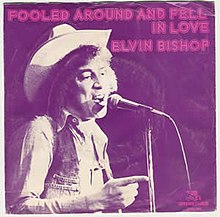
Elvin Richard Bishop is an American blues and rock music singer, guitarist, bandleader, and songwriter. An original member of the Paul Butterfield Blues Band, he was inducted into the Rock and Roll Hall of Fame as a member of that group in 2015 and the Blues Hall of Fame in his own right in 2016.
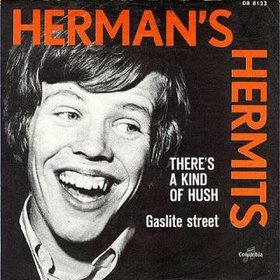
"There's a Kind of Hush" is a popular song written by Les Reed and Geoff Stephens. Originally recorded by Stephens' group the New Vaudeville Band in 1967 as a neo-British music hall number, this version of the track became a hit in Australia and South Africa. However, in the rest of the world, a near-simultaneous cover was a big hit for Herman's Hermits. The song was a charted hit again in 1976 for The Carpenters.

"Someone Saved My Life Tonight" is a song, with music by English musician Elton John and lyrics by Bernie Taupin, from John's 1975 album Captain Fantastic and the Brown Dirt Cowboy. It was released as a single on 23 June 1975, the only single released from the album. Like the rest of the album, the song is autobiographical, and addresses an attempted suicide by John.

"Lonely Boy" is an international hit song from 1977, written and recorded by Andrew Gold in 1976 for his album What's Wrong with This Picture? It spent five months on the American charts, peaking at number seven in both Canada and the United States, the latter for three consecutive weeks on June 11, 18 and 25, 1977, and number 11 in the United Kingdom. While "Lonely Boy" would be Gold's biggest U.S. hit, his track "Never Let Her Slip Away" achieved greater success in the U.K.

"Island Girl" is a 1975 song by English musician Elton John. It was written by John and his songwriting collaborator Bernie Taupin and released as the first single from the album Rock of the Westies (1975). It reached number one for three weeks on the Billboard Hot 100 in the U.S., selling over one million copies, and also reached the top twenty in Canada, New Zealand, Australia and the UK.

"What a Fool Believes" is a song written by Michael McDonald and Kenny Loggins. The best-known version was recorded by the Doobie Brothers for their 1978 album Minute by Minute. Debuting at number 73 on January 20, 1979, the single reached number one on the Billboard Hot 100 on April 14, 1979, for one week. The song received Grammy Awards in 1980 for both Song of the Year and Record of the Year.
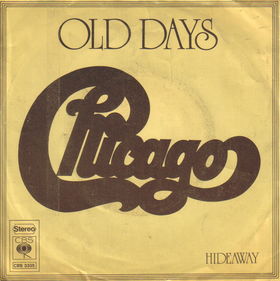
"Old Days" is a song written by James Pankow for the group Chicago and recorded for their album Chicago VIII (1975). It was the second single released from that album with lead vocals by Peter Cetera.

"Baby, What a Big Surprise" is a ballad written by Chicago's then bassist/singer Peter Cetera, which appeared on their album Chicago XI (1977), with Cetera singing lead vocals. The first single released from the album reached number 4 on the US Billboard Hot 100 chart.
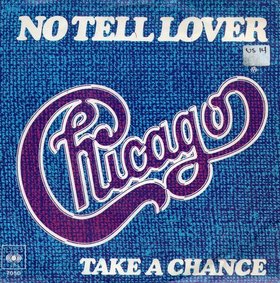
"No Tell Lover" is a song written by Lee Loughnane, Danny Seraphine, and Peter Cetera for the group Chicago and recorded for their album Hot Streets (1978), with Cetera and Donnie Dacus singing lead vocals. The second single released from that album, it reached No. 14 on the U.S. Billboard Hot 100 chart and No. 5 on the adult contemporary chart.

"Only Yesterday" is a song recorded by the Carpenters. Released on March 14, 1975, the song was composed by Richard Carpenter and John Bettis. "Only Yesterday" peaked at number four on the Billboard Hot 100 and number one on the Adult Contemporary (AC) charts, The Carpenters' eleventh number one on that chart.
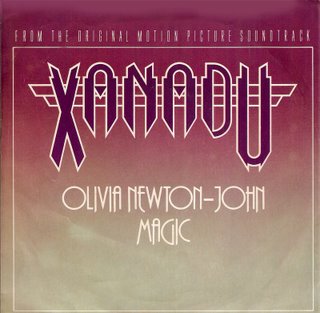
"Magic" is a song recorded by British-Australian singer Olivia Newton-John for the soundtrack to the 1980 musical fantasy film Xanadu. Written and produced by John Farrar, the song was released as the lead single from the album in May 1980 and topped the US Billboard Hot 100 for four weeks beginning on August 2. On August 30, it was displaced from the top by Christopher Cross's "Sailing".

"Lonely Night (Angel Face)" is a song written by Neil Sedaka. The song was first recorded by Sedaka and appeared as a track on his 1975 studio album, The Hungry Years. The following year the song was made popular when covered by the pop music duo Captain & Tennille, who took their version to number 3 on the Billboard Hot 100.
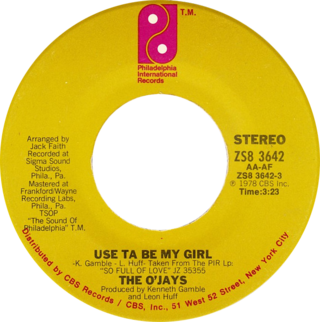
"Use ta Be My Girl" is a song by R&B vocal group The O'Jays. Released from their hit 1978 album, So Full of Love, it became a crossover hit. The song spent five weeks at number one on the R&B singles chart. It also peaked at number four on the Billboard Hot 100 singles chart. "Use ta Be My Girl" became one of the biggest and most familiar hits by The O'Jays. The song has also been certified by the RIAA as a million-seller.

"Boogie Fever" is a song recorded by Los Angeles, California-based R&B group the Sylvers, from their 1975 album Showcase. Their most lucrative single, it reached No. 1 in the US on both the Billboard Hot 100 and Hot Soul Singles charts as well as reaching No. 1 in Canada on the RPM national singles chart in 1976. It was their third of nine Top 20 R&B hits and first top 40 pop single. Billboard ranked it as the No. 20 song for 1976. "Boogie Fever" is one of two gold records by the Sylvers, the other being "Hot Line".

"Couldn't Get It Right" is a 1976 song by the Climax Blues Band. The song was written after the band's label told them that their 1976 album Gold Plated lacked a standout track and asked them to "try and write a hit". They then wrote it, in the words of its bassist Derek Holt, "from absolutely nowhere", and it hit #10 on the UK Singles Chart.
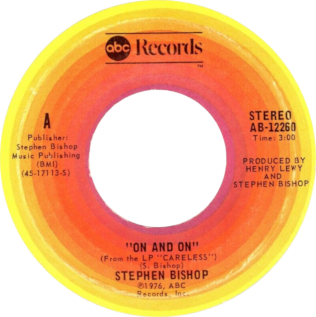
"On and On" is a song by American singer-songwriter Stephen Bishop. The song, from his debut album Careless, became a major hit, peaking at number 11 on the U.S. Billboard Hot 100 and spending 28 weeks on the chart. In Canada, the song peaked at number 6.
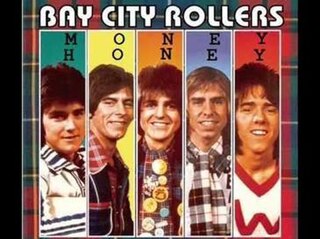
"Money Honey" is the title of a 1975 international hit single by the Bay City Rollers, taken from their album Rock n' Roll Love Letter and in the UK on their album Dedication. The power-pop recording was issued in the US as the album's lead single in January 1976, reaching number nine on the Hot 100 in Billboard magazine that March. "Money Honey" was the Bay City Rollers' second US Top 10 hit. It reached number seven on the Cash Box chart. The follow-up single was the album's title track, "Rock and Roll Love Letter". In the UK, "Money Honey" was released in November 1975 and reached number three, becoming the group's ninth Top 10 single.
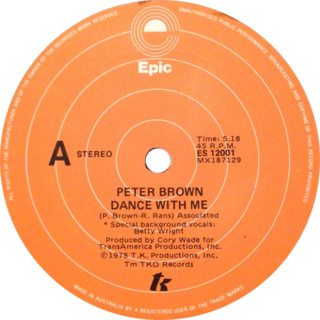
"Dance With Me" is a 1978 international hit single recorded by Peter Brown. It was the second release from his first LP, and became his greatest hit. Backing vocals were provided by Betty Wright along with her girlfriends Patricia Hurley and Wildflower.

"Stand Tall" is the title of an international hit single by Burton Cummings, taken from his eponymous debut album. The song was released less than two years after "Dancin' Fool", the final hit single by the group for which Cummings had been lead singer, The Guess Who.
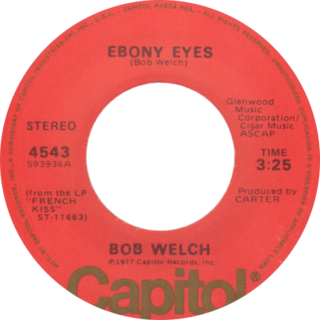
"Ebony Eyes" is a song written and performed by Bob Welch. The song was the second single release and second hit song from his album French Kiss. Backing vocals are provided by Juice Newton.
